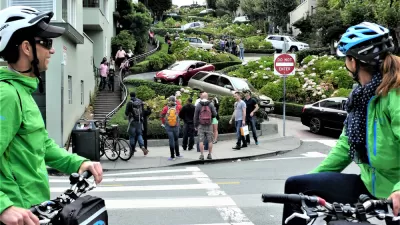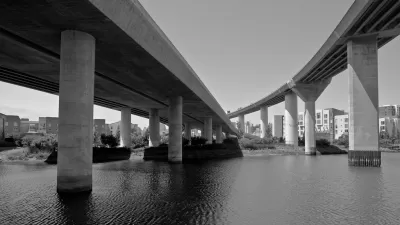If Gov. Gavin Newsom signs legislation by San Francisco Assemblyman Phil Ting, motorists who want to drive the 'world's most crooked street,' a huge tourist draw, will be forced to participate in a pilot 'reservation and pricing program.'

While not exactly 'Manhattan-style congestion pricing,' where drivers headed south of 60th Street will be subject to a hefty toll come January 2021, the Lombard Street 'reservation fee' had to clear the same legislative hurdle, as the state Assembly press release (source article) indicates.
The bill by Assemblymember Phil Ting (D-San Francisco) is necessary because existing law prohibits a local agency from imposing a tax, permit fee, or other charge for the use of its streets or highways.
The bill, "AB 1605: City and County of San Francisco: Crooked Street Reservation and Pricing Program," passed the Assembly on a 54-23-2 vote on Thursday. Gov. Newsom (D), the city's mayor from 2004 to 2011, has until Oct. 13 to sign or veto it. If he signs, the next step would be in the hands of the Board of Supervisors of the City and County of San Francisco, according to the bill's text:
This bill would authorize the Board of Supervisors of the City and County of San Francisco by ordinance to conduct a reservation and pricing pilot program for vehicles that use the “Crooked Street,” which the bill would define to mean the portion of Lombard Street located between Leavenworth Street and Hyde Street in the City and County of San Francisco.
Before the board of supervisors adopts an ordinance to conduct the pilot program, the bill would require the board of supervisors to make certain findings and to conduct at least 2 public outreach meetings or hearings...
The reservation program would be an all-electronic system, supported by a website, mobile app, and possible on-street kiosks to enable reservations, payments, and user support, according to the Sept. 4 legislative analysis. It states that the "current plan is for a staff [sic] onsite to check reservations, through paper and electronic means, and help direct vehicles, operating from 9:00 a.m. to 9:00 p.m. and cost $5 on weekdays and $10 on weekends and holidays."
Unlike the Manhattan plan and all other cordon pricing schemes being considered by large cities in the U.S., including San Francisco, AB 1605 encountered no formal opposition. Yet pricing streets, even more so than parking, is inherently controversial, explaining why 28 percent of legislators in both chambers opposed the bill.
Other alternatives considered
The seven-year pilot program fits the description of road pricing, a type of tolling, which was one of several considerations to deal with the street congestion, as noted in a September 2016 post on a study conducted by the San Francisco County Transportation Authority:
After a year researching how other tourist destinations handle similar problems, the study is now exploring solutions—including barring cars and turning the area into a pedestrian-only plaza...Other proposals include hiring a mass of parking and safety officers, requiring reservations, and charging a toll.
The fact that a car ban was not selected, yet was considered, is noteworthy. In essence, the authority chose a market-based measure to manage demand over the simpler, but arguably more extreme, ban, which presumably would not have required state legislation.
Assuming the governor signs AB 1405, chalk this pricing initiative up as a win for the Transportation Authority and Assemblyman Ting. The authority's Pricing & Incentives webpage lists three additional, ongoing projects:
- Carpool and express lanes on freeways
- Downtown congestion pricing
- A toll to enter and exit Treasure Island
Additional reading:
- Tourists May Soon Have to Pay to Drive San Francisco’s Lombard Street, Associated Press, Sept. 6, 2019
- Gridlock At The World-Famous “Crooked Street” Prompts Legislation To Soothe Residents' Woes, San Francisco Magazine, Aug. 23, 2019
Related in Planetizen:
-
Crowds of Pedestrians Prompt Lombard Street Study, September 22, 2016
-
SF's Congestion Pricing Plan Advances, November 15, 2010
Hat tip to Nannette Miranda.
FULL STORY: Ting Proposal for Reservation & Pricing System On World Famous Lombard Street Heads to the Governor

Study: Maui’s Plan to Convert Vacation Rentals to Long-Term Housing Could Cause Nearly $1 Billion Economic Loss
The plan would reduce visitor accommodation by 25,% resulting in 1,900 jobs lost.

North Texas Transit Leaders Tout Benefits of TOD for Growing Region
At a summit focused on transit-oriented development, policymakers discussed how North Texas’ expanded light rail system can serve as a tool for economic growth.

Why Should We Subsidize Public Transportation?
Many public transit agencies face financial stress due to rising costs, declining fare revenue, and declining subsidies. Transit advocates must provide a strong business case for increasing public transit funding.

How to Make US Trains Faster
Changes to boarding platforms and a switch to electric trains could improve U.S. passenger rail service without the added cost of high-speed rail.

Columbia’s Revitalized ‘Loop’ Is a Hub for Local Entrepreneurs
A focus on small businesses is helping a commercial corridor in Columbia, Missouri thrive.

Invasive Insect Threatens Minnesota’s Ash Forests
The Emerald Ash Borer is a rapidly spreading invasive pest threatening Minnesota’s ash trees, and homeowners are encouraged to plant diverse replacement species, avoid moving ash firewood, and monitor for signs of infestation.
Urban Design for Planners 1: Software Tools
This six-course series explores essential urban design concepts using open source software and equips planners with the tools they need to participate fully in the urban design process.
Planning for Universal Design
Learn the tools for implementing Universal Design in planning regulations.
City of Santa Clarita
Ascent Environmental
Institute for Housing and Urban Development Studies (IHS)
City of Grandview
Harvard GSD Executive Education
Toledo-Lucas County Plan Commissions
Salt Lake City
NYU Wagner Graduate School of Public Service





























